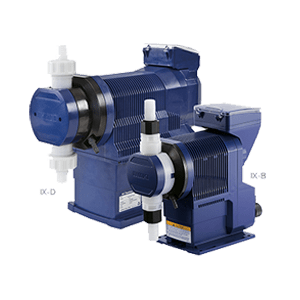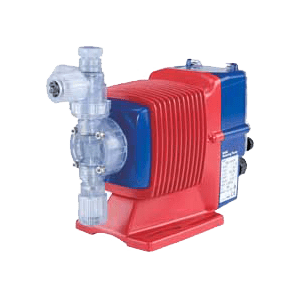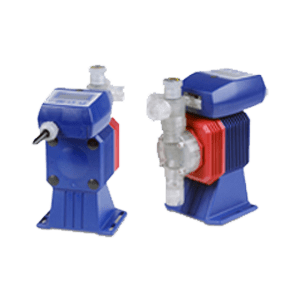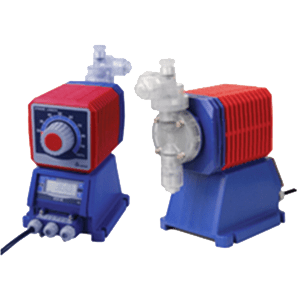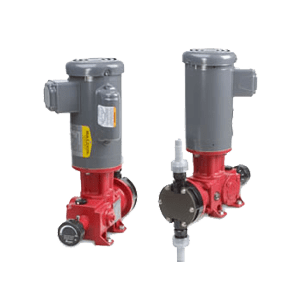One common substance in water, calcium carbonate, has both potential benefits and risks. Although it is a naturally occurring component of many water sources, its buildup can seriously damage both municipal and industrial systems. Its management, which was previously frequently an inaccurate and manual process, presents a challenge. Water treatment is significantly hampered by calcium carbonate’s propensity to precipitate and create scale. Scaling can happen to boilers, pipes, and other equipment, which can lower performance and raise maintenance costs. Conventional approaches to calcium carbonate management frequently entail the costly and sometimes unreliable use of pharmacologic inhibitors or labor-intensive manual dosing.
Precise dosage is necessary for calcium carbonate control to keep water systems at optimal levels. This requires the utilization of dependable pumps that can precisely provide dosages of dispersants or calcium carbonate inhibitors. Manual dosing techniques are not appropriate for systems that need constant, accurate management since they are prone to human mistake. In order to minimize the risk of scaling and corrosion and to ensure uniform treatment, automated pumping systems present a more dependable and effective option.
Choosing a Calcium Carbonate Pump
Selecting the right pump for managing calcium carbonate in water treatment systems is essential to ensure effective treatment and system longevity. With various factors to consider, choosing the optimal pump requires careful evaluation of specific requirements and operational needs. Here are key considerations to guide you in selecting a calcium carbonate pump:
Precision Dosing Capability: One of the primary functions of a calcium carbonate pump is to precisely dose inhibitors or dispersants to control calcium carbonate levels in water systems. Look for pumps equipped with advanced dosing algorithms and accurate flow control mechanisms to ensure precise dosing, minimizing the risk of under or overdosing.
Chemical Compatibility: Calcium carbonate pumps come into direct contact with chemical additives used in water treatment. Ensure that the pump’s wetted materials are compatible with these chemicals to prevent corrosion and maintain long-term reliability. Materials such as PVC, stainless steel, and corrosion-resistant plastics are commonly used for handling chemical additives in water treatment applications.
Pump Design and Construction: The design and construction of the pump play a crucial role in its performance and durability. Opt for pumps with robust construction and corrosion-resistant materials to withstand the harsh operating conditions associated with water treatment processes. Additionally, consider factors such as ease of maintenance, accessibility of components, and reliability of seals and gaskets.
Flow Rate and Capacity: Evaluate the specific flow rate and capacity requirements of your water treatment system when selecting a calcium carbonate pump. Choose a pump that can deliver the necessary flow rate to effectively distribute chemical additives throughout the system while accommodating variations in water flow and demand.
Automation and Control Features: Automation and control capabilities are essential for optimizing the operation of calcium carbonate pumps and ensuring consistent treatment performance. Look for pumps with advanced control features, such as programmable dosing schedules, remote monitoring, and integration with water treatment systems, to streamline operations and minimize manual intervention.
Choosing a Calcium Carbonate Pump
Selecting the right pump for managing calcium carbonate in water treatment systems is essential to ensure effective treatment and system longevity. With various factors to consider, choosing the optimal pump requires careful evaluation of specific requirements and operational needs. Here are key considerations to guide you in selecting a calcium carbonate pump:
Precision Dosing Capability: One of the primary functions of a calcium carbonate pump is to precisely dose inhibitors or dispersants to control calcium carbonate levels in water systems. Look for pumps equipped with advanced dosing algorithms and accurate flow control mechanisms to ensure precise dosing, minimizing the risk of under or overdosing.
Chemical Compatibility: Calcium carbonate pumps come into direct contact with chemical additives used in water treatment. Ensure that the pump’s wetted materials are compatible with these chemicals to prevent corrosion and maintain long-term reliability. Materials such as PVC, stainless steel, and corrosion-resistant plastics are commonly used for handling chemical additives in water treatment applications.
Pump Design and Construction: The design and construction of the pump play a crucial role in its performance and durability. Opt for pumps with robust construction and corrosion-resistant materials to withstand the harsh operating conditions associated with water treatment processes. Additionally, consider factors such as ease of maintenance, accessibility of components, and reliability of seals and gaskets.
Flow Rate and Capacity: Evaluate the specific flow rate and capacity requirements of your water treatment system when selecting a calcium carbonate pump. Choose a pump that can deliver the necessary flow rate to effectively distribute chemical additives throughout the system while accommodating variations in water flow and demand.
Automation and Control Features: Automation and control capabilities are essential for optimizing the operation of calcium carbonate pumps and ensuring consistent treatment performance. Look for pumps with advanced control features, such as programmable dosing schedules, remote monitoring, and integration with water treatment systems, to streamline operations and minimize manual intervention.
What Industries and Applications Handle Calcium Carbonate?
Water Treatment
Municipal Water Treatment Plants: Calcium carbonate is often present in water sources and can lead to scaling issues in pipes and equipment. Water treatment plants use calcium carbonate inhibitors or dispersants to control scaling and maintain water quality.
Industrial Water Treatment: Industries such as power generation, manufacturing, and mining utilize water treatment processes to remove impurities and control calcium carbonate levels in cooling water systems, boilers, and process water streams.
Food and Beverage
Food Additive: Calcium carbonate is used as a food additive (E170) in various food products, including baked goods, dairy products, and beverages, as a source of dietary calcium and as a pH regulator.
Beverage Manufacturing: In the beverage industry, calcium carbonate is used as a mineral supplement to fortify juices, bottled water, and sports drinks with essential nutrients.
Pharmaceuticals
Medicinal Preparations: Calcium carbonate is used as an active ingredient in antacid medications to neutralize stomach acid and provide relief from heartburn, acid indigestion, and upset stomach.
Dietary Supplements: Calcium carbonate supplements are commonly used to prevent or treat calcium deficiency and osteoporosis, as well as to support bone health and strength.
Agriculture
Soil Amendment: Calcium carbonate is applied as a soil amendment to neutralize acidic soils and improve soil pH levels, promoting healthy plant growth and enhancing nutrient uptake.
Animal Feed: In animal agriculture, calcium carbonate is used as a dietary supplement for livestock and poultry to ensure proper bone development, eggshell formation, and overall animal health.
Construction and Building Materials
Cement Production: Calcium carbonate is a key ingredient in the production of cement and concrete, where it acts as a filler material to enhance strength, durability, and workability.
Paints and Coatings: In the paints and coatings industry, calcium carbonate is used as a pigment extender, filler, and rheology modifier in various formulations to improve opacity, viscosity, and covering power.
Paper and Pulp
Papermaking: Calcium carbonate is commonly used as a filler and coating pigment in the paper and pulp industry to improve paper quality, brightness, opacity, and printability while reducing production costs.
Plastics and Polymers
Plastic Compounding: Calcium carbonate is added to plastic formulations as a filler and reinforcing agent to improve mechanical properties, dimensional stability, and processing characteristics in products such as PVC pipes, profiles, and films.
What are the Properties of Calcium Carbonate that Affect Which Pump Type and Material to Purchase?
When selecting a pump for handling calcium carbonate in water treatment or other industrial processes, it’s crucial to consider the properties of calcium carbonate that can impact pump performance and material compatibility. Here are the key properties to keep in mind:
Abrasive Nature: Calcium carbonate can have abrasive tendencies, especially in its solid form. This abrasive nature can accelerate wear and tear on pump components, particularly in high-velocity applications. Pumps with abrasion-resistant materials or coatings may be necessary to mitigate wear and extend pump longevity.
Corrosive Potential: While calcium carbonate itself is not corrosive, it can become corrosive when dissolved in water with low pH or when combined with acidic additives for treatment purposes. Pumps handling calcium carbonate solutions must be constructed from materials resistant to corrosion, such as stainless steel, PVC, or specialty plastics like PVDF (polyvinylidene fluoride) or PTFE (polytetrafluoroethylene).
Scale Formation: Calcium carbonate tends to precipitate and form scale when concentrations exceed solubility limits. This scale formation can lead to blockages and reduced pump efficiency. Pumps with features to prevent scaling, such as smooth internal surfaces, anti-scaling coatings, or self-cleaning mechanisms, may be advantageous in preventing operational issues.
Viscosity Variability: The viscosity of calcium carbonate solutions can vary depending on factors such as concentration and temperature. Pumps selected for handling calcium carbonate must be capable of handling variable viscosity fluids effectively. Positive displacement pumps, such as diaphragm or peristaltic pumps, may be preferred for applications with significant viscosity fluctuations.
Particle Size and Suspension Stability: Calcium carbonate suspensions may contain varying particle sizes and degrees of stability. Pumps must be capable of handling suspensions without causing excessive shearing or sedimentation. Consideration should be given to pump designs and impeller types that minimize shear forces and maintain suspension stability.
The Walchem Advantage
Walchem’s Calcium Carbonate Pumps offer a superior alternative, providing precise and automated control of calcium carbonate levels in your water systems. Our state-of-the-art technology ensures optimal performance, minimizing scaling issues and maximizing operational efficiency. With Walchem, you can prevent manual dosing errors and streamlined water treatment processes.
- Precision Dosing: The Calcium Carbonate Pumps utilizes advanced dosing algorithms to accurately control calcium carbonate levels, preventing both under and overdosing.
- Automated Operation: Say goodbye to manual intervention. Our pump can be equipped with intelligent sensors and controllers, allowing for fully automated operation and remote monitoring.
- Customizable Settings: Tailor the pump’s settings to meet the specific needs of your water system, ensuring optimal performance and efficiency.
- Compact Design: With a compact footprint, the Calcium Carbonate Pumps can be easily integrated into existing water treatment setups, saving valuable space.
- Energy Efficiency: Our pump is designed with energy-saving features, helping you reduce operational costs while minimizing environmental impact.
- Reliability: Built to last, Walchem’s Calcium Carbonate Pumps are engineered with robust materials and components, ensuring long-term reliability and minimal maintenance requirements.

